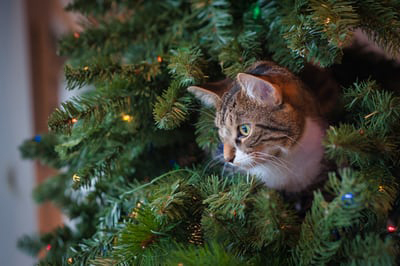Media – Plants, snacks, & drugs
Avoid Poisons & Injury
Conspicuous Christmas consumption isn’t just for humans; our pets eagerly indulge in dietary indiscretion too. The ASPCA Animal Poison Control Center provides the following list of holiday hazards. There are bound to be others.
Edibles: alcoholic beverages, chocolate, coffee (grounds, beans, chocolate covered espresso beans), moldy or spoiled foods, onions, onion powder, fatty foods, salt, yeast dough.
Plants: Lilies are potentially deadly for cats, poinsettias may cause vomiting or nausea, mistletoe can cause heart problems but usually just stomach upset, and eating Holly leads to vomiting, nausea, diarrhea, and lethargy.
Christmas tree: Drinking fertilized tree water results in stomach upset. Stagnant tree water (and whose isn’t?) is a bacterial breeding ground. Watch for vomiting, nausea, and diarrhea. Chewing electric cords may result in electrocution. Swallowed ribbons and tinsel can cause intestinal obstruction. Pets who chew or ingest batteries release corrosives, leading to ulceration of the lips, tongue, stomach and intestines. Glass ornaments can be chewed and swallowed. You already know what that means.
Pets can drink liquid potpourri from pots or spills or rub against leaky containers. Self-grooming can lead to severe oral, skin, and eye damage. Swallowed dry potpourri can be toxic or become an intestinal foreign body.
Drugs: Even small doses of pain relievers, cold medicines, anti-cancer drugs, antidepressants (cats love Effexor), vitamins, and diet pills can be lethal. One regular-strength ibuprofen tablet can cause stomach ulcers in a 10-pound dog. Less than one regular strength acetaminophen tablet is dangerous to a cat. Check with your veterinarian before sharing medications.
Winter hazards: Drinking just one teaspoon of antifreeze can kill a cat; four teaspoons would be dangerous to a 10-pound dog. Propylene glycol antifreeze is much safer. Ice melting products can be irritating to skin and mouth. Rat and mouse killers – Fuggetaboutit if you have pets. Locating these baits in areas inaccessible to cats or dogs guarantees nothing; dying rodents can stagger into a pet’s home, making sport hunting too easy to resist. Swallowing a poisoned varmint is dangerous to one’s health, regardless of species.
Call if concerned: ASPCA Animal Poison Control Center (1-888-4-ANI-HELP). Pet Poison Helpline 800-213-6680 ($35 fee). And don’t forget to wear your mask.
Dr. Jeff Nichol, a residency-trained veterinary behaviorist, provides consultations in-person and by telephone and Zoom (505-792-5131). Each week he shares a blog and a Facebook Live video to help bring out the best in pets and their people. Sign up at no charge at drjeffnichol.com. Post questions on pet behavioral or physical concerns on facebook.com/drjeffnichol or by US Post to 4000 Montgomery Blvd. NE, Albuq, NM 87109.


